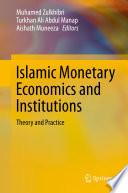With the impressive emergence of Islamic finance as a branch of Islamic economics, the need for a solid knowledge base that encompasses theories, thoughts and applications related to the subject increased in importance. However, writing about Islamic economics is a great challenge due to the differences in opinion on many of its issues. This includes methodologies for determining the Islamic perspective on economic concepts and issues as well as applicable solutions for today’s economic and social problems. It is further argued that Islamic economics topics are not as clear as those in conventional economics as they have their own religious, spiritual and social dimensions. The points of controversy have generated lengthy discussions. Moreover, Islamic economics encompasses a vast array of topics and approaches, from the purely theoretical, which may include philosophy or religious ideas, to mathematical and quantitative analyses. We tried our best throughout this textbook to simplify, clarify and summarise these concepts to make them accessible to all readers including students, practitioners, academics and even interested non-specialists. This textbook presents, discusses and analyses various topics and issues related to Islamic economics ranging from philosophical, epistemological and methodological to microeconomic and macroeconomic perspectives. In this endeavour, the social aspect of Islamic economics—an essential part of the discipline—is not neglected. The textbook compares Islamic ideas and concepts related to economics with those in conventional economics to highlight Islamic economics as a distinct field of knowledge with an emphasis on the ethical and social aspects. The authors have tried their level best to explain the theoretical concepts as simply as possible without ignoring today’s realities and without compromising Sharīʿah principles and objectives. One of the main objectives of the book is to provide the reader with Islamic economic ideas and solutions that are realistic and applicable within the current highly globalised economic and business environment, which is largely dominated by conventional interest-based systems and institutions. Despite being written for an elementary-level audience, this textbook can also be beneficial to a wide range of specialist and non-specialist readers and seekers of knowledge. For those specialising in Islamic economics, it is an appropriate source of reference to gain an overview on different topics relating to the foundations of Islamic economics. At this point, however, it must be mentioned that each topic deliberated upon, by its nature, would require a book on its own to cover all its aspects. Therefore, further exploration is required for Islamic economics specialists. A list of references and recommended readings is provided for that purpose at the end of each chapter. On the other hand, students of mainstream economics, finance and other academic majors will find this textbook an excellent resource for comprehensive knowledge of Islamic economics and its related issues. Universities may benefit from the different topics presented in this textbook in designing or preparing their economics courses at different levels based on their own curriculums and classes. This textbook could be used at the undergraduate level or even for a master’s level economics or Islamic economics course, especially in an Islamic banking and finance programme or for an MBA having a specialisation in Islamic banking and finance where an economics or Islamic economics course is offered. Furthermore, practitioners and interested readers who are seeking essential and simple knowledge about Islamic economics will also find this textbook to be a helpful guide. It is important to mention here that Islamic economics literature shows wide differences among the scholars in almost every subtopic. Presenting all opinions within a limited number of pages is almost impossible. However, with the great contribution of more than 60 scholars from a wide span of countries and from various economic schools, this book represents an important attempt to present the topics and issues from various perspectives with the maximum objectivity possible. Through comprehensive content editing, the editors have striven to improve the flow of arguments, remove inconsistencies and put the ideas together in as coherent a manner as possible. However, the editors acknowledge that some biases and overlaps may still persist.
-
ISBN 13 : 9671656811
-
ISBN 10 : 9789671656815
-
Judul : Islamic Economics: Principles and Analysis
-
Pengarang :
Moutaz Abojeib,
Muhammad Anas Zarka,
Muhammad Fahim Khan,
Muhammad Irwan Ariffin,
Muhammad Syukri Salleh,
Rifki Ismal,
Rokiah Alavi,
Ruzita Mohd Amin,
Saiful Azhar Rosly,
Selamah Abdullah Yusof,
Ugi Suharto,
Zubair Hasan,
Adam Abdullah,
Adam Ng,
Akhmad Affandi Mahfudz,
Ataul Huq Pramanik,
Gairuzazmi Mat Ghani,
Hafas Furqani,
Irum Saba,
Izyani Zulkifli,
Kasule Twaha Ahmed,
Maya Puspa Rahman,
Mohammed Obaidullah,
Mohd Azmi Omar,
Mohd Nahar Mohd Arshad,
Mohd Nizam Barom,
Mohd-Pisal Zainal,
Monzer Kahf,
Muhammad Anas Zarka,
Muhammad Fahim Khan,
Muhammad Irwan Ariffin,
Muhammad Syukri Salleh,
Rifki Ismal,
Rokiah Alavi,
Ruzita Mohd Amin,
Saiful Azhar Rosly,
Selamah Abdullah Yusof,
Ugi Suharto,
Zubair Hasan,
Adam Abdullah,
Adam Ng,
Akhmad Affandi Mahfudz,
Ataul Huq Pramanik,
Gairuzazmi Mat Ghani,
Hafas Furqani,
Irum Saba,
Izyani Zulkifli,
Kasule Twaha Ahmed,
Maya Puspa Rahman,
Mohammed Obaidullah,
Mohd Azmi Omar,
Mohd Nahar Mohd Arshad,
Mohd Nizam Barom,
Mohd-Pisal Zainal,
Monzer Kahf,
-
Kategori : Business & Economics
-
Penerbit : International Shari’ah Research Academy for Islamic Finance (ISRA)
-
Bahasa : en
-
Tahun : 2018
-
Halaman : 814
-
Google Book : http://books.google.co.id/books?id=OjzYDwAAQBAJ&dq=intitle:Islamic+Macroeconomics&hl=&source=gbs_api
-
Ketersediaan :
However, with the great contribution of more than 60 scholars from a wide span of countries and from various economic schools, this book represents an important attempt to present the topics and issues from various perspectives with the ...










